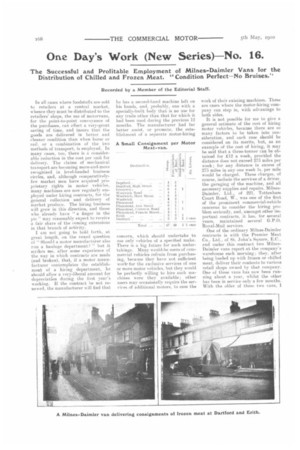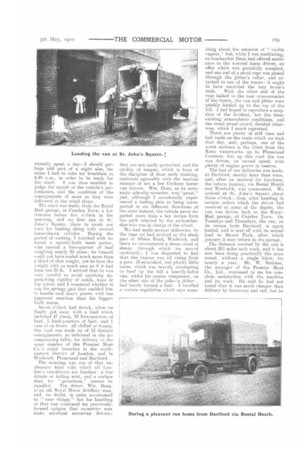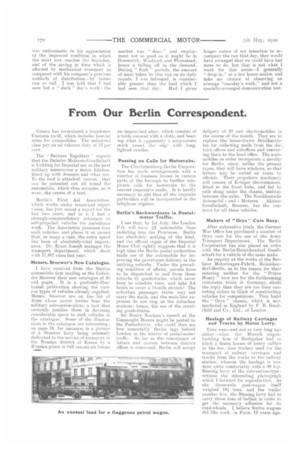One Day's Work (New Series) No. 16.
Page 4

Page 5

Page 6

If you've noticed an error in this article please click here to report it so we can fix it.
The Successful and Profitable Employment of Milnes-Daimler Vans for the Distribution of Chilled and Frozen Meat. "Condition Perfect—No Bruises."
Recorded by a Member of the Editorial Staff.
In all cases where foodstuffs are sold to retailers at a central market, whence they must he distributed to the retailers' shops, the use of motorvans, for the point-to-point conveyance of the.purchases, can effect a very-great saving of time, and insure that the goods are delivered in better and cleaner condition than when horse or rail, or a combination of the two methods of transport, is employed. In many cases, too, there is a considerable reduction in the cost per unit for delivery. The claims of mechanical transport are becoming more-and-more recognized in level-headed business circles, and, although comparativelyfew market men have acquired proprietary rights in motor vehicles, many machines are now regularly employed under hiring contracts, for the general collection and delivery of market produce. The hiring business will grow in this direction, and those who already have "a linger in the pie" may reasonably expect to receive a fair share of the coming extensions in that branch of activity.
I am not going to hold forth, at great length, on the vexed question of " Should a motor manufacturer also run a haulage department? " but itstrikes me, after some experience of the way in which contracts are made (and broken), that, if a motor manufacturer contemplates the establishment of a hiring department, he should allow a very-liberal amount for depreciation during the first year's working. If the contract be not renewed, the manufacturer will find that he has a second-hand machine left on his hands, and, probably, one with a specially-built body that is no use for any trade other than that for which it had been used during the previous 12 months. The manufacturer had far better assist, or promote, the establishment of a separate motor-hiring concern, which should undertake to use only vehicles of a specified make. There is a big future for such undertakings. Many would-be users of commercial vehicles refrain from purchasing, because they have not sufficient work-for the exclusive services of one or more motor vehicles, but they would be perfectly willing to hire such machines were they available; other users may occasionally require the services of additional motors, to ease the work of their existing machines. These are cases where the motor-hiring company can step in, with advantage to both sides.
It is not possible for me to give a general estimate of the cost of hiring motor vehicles, because there are so many factors to be taken into consideration, and each case should be considered on its merits, but, as an example of the cost of hiring, it may be said that a three-tonner can be obtained for £12 a week, provided the distance does not exceed 275 miles per week ; for any distance in excess of 275 miles in any one week Is. per mile would be charged. These charges, of course, include the services of a driver. the garaging of the machine, and all necessary supplies and repairs. MilnesDaimler, Ltd., of 221, Tottenham Court Road, W., was one of the first of the prominent commercial-vehicle concerns to consider the hiring problem seriously, and, amongst other important contracts, it has, for several years, maintained several G.P.O. Royal-Mail services.
One of the ordinary Milnes-Daimler contracts is with the Premier Meat Co., Ltd., of St. John's Square, E.C., and under this contract two MilneDaimler vans report at the company's warehouse each morning ; they, after being loaded up with frozen or chilled meat, deliver their contents to various retail shops owned by that company. One of these vans has new been running about a year, whilst the other has been in service only a few months. With the older of these two vans, I
recently spent a day--I should perhaps add part of a night also, because I had to take my breakfast at 4.30 a.m., in order to be ready for
the start. I was thus enabled to judge for myself of the vehicle's performance, and the condition of the consignments of meat as they were delivered at the retail shops.
The start was made, from the Royal Mail garage, at Camden Town, a few minutes before five o'clock in the morning, and we first ran to St. John's Square, there to await our turn for loading along with several horse-drawn vehicles. During the period of waiting, I watched with interest a sparely-built meat porter, who carried a fore-quarter of beef weighing nearly 26 stone: he himself could not have scaled much more than a third of that weight, yet he bore the weight with as much ease as if it had been but 26 lb. I noticed that he was very Careful to avoid anything approaching rigidity of ankle, knee or hip joints, and I wondered whether it was his springy gait that enabled him to handle such heavy pieces. with less apparent exertion than his biggerbuilt mates.
Seven o'clock had struck, when we finally got away with a load which included 47 sheep, 29 fore-quarters of beef, 5 hind-quarters of beef, and 1 ease of ox livers all chilled or frozen. Our load was made up of 12 distinct consignments, as indicated in the aceompanying table, for delivery to the same. number of the Premier Meat Co.'s retail branches in the southeastern district of London, and in Wonlwich. Plumstead and Dartford.
The morning was one of that unpleasant kind with which all London's van-drivers are familiar a fine drizzle or falling mist, and a. surface that, for " greasiness," cannot be equalled. The driver, Wm. Dean, is an old Royal Horse Artillery man. and, no doinht, is quite accustomed to " near things" but his handling of that van confirmed my previously_ formed opinion that ex-service men make excellent motorvan drivers ;
they are not easily perturbed, and the civility of tongue, which is born of the discipline of their early training, contrasts agreeably with the insolent manner of not a few Cockney horsevan drivers. Wm. Dean, as an automatic side-slip corrector, was "great," and, although I occasionally experienced a feeling akin to being transported in six different directions at the same instant, the vehicle never departed more than a few inches from the path selected by the ex-bombardier who was in charge of the wheel.
We had made several deliveries, by the time we had arrived at the steep part of Albion Road, Woolwich, and there we encountered a dense cloud of steam, through which we moved cautiously ; I was disgusted to find that the vapour was all rising from a poor, ill-nourished, but plucky little horse, which was bravely attempting to haul up the hill a heavily-laden van, whilst his equine companion, on the other side of the pole--a jibber-had barely turned a hair. I recalled a certain regulation which says some thing about the emission of " visible vapour," but, while I was meditating, ex-bombardier Dean had offered assistance to the worried horse driver, an offer which was gratefully accepted, and one end of a stout rope was passed through the ,jibber's collar, and attached to one of the traces: it ought to have encircled the lazy brute's neck, With the other end of the rope lashed to the rear cross-member of the frame, the van and jibber were quickly hauled up to the top of the hill. I had hoped to reproduce a snapshot of the incident, but the thenexisting atmospheric conditions, and the usual street crowd, decided otherwise, which I much regretted.
There are plenty of stiff rises and had roads on the route which we took that day, and, perhaps, one of the worst sections is the climb from the Kent waterworks up to Plumstead Common, but up this road the van was driven, on second speed, with plenty of engine power in reserve.
The last of our deliveries was made, at Dartford, shortly later than noon, and, after an interval for luncheon, the return journey, via Bostal Heath and Woolwich, was commenced. We arrived at St. John's Square about three o'clock ; then, after handing in certain orders which the driver had received at some of the depots, the van was driven back to the RoyalMail garage, at Camden Town. On Tuesdays and Thursdays, the van, on its return from Dartford, is again loaded, and is sent off with its second load to Manor Park, after which journey it may return to the garage.
The distance covered by the van is about 265 miles each week, and it has now been doing practically the same round, without a single hitch, for nearly a year. Mr. W. Butcher, the manager of the Premier Meat Co., Ltd., expressed to me his complete satisfaction with the machine and its work. Ile said he had not found that it was much cheaper than delivery by horse-van and rail, but he was enthusiastic in his appreciation of the improved condition in whit+ the meat now reaches the branches, and of the saving in time which is effected by mechanical transport as compared with his company's previous methods of distribution—by horseyen or rail. I was told that T had seen but a " slack " day's work ; the market was " dear... and employment not so good as it might be in Greenwich, Woo] with and Plumstead, hence a falling off in the demand. During " flush " periods, the amount of meat taken by this van on its daily rounds, t was informed, is considerably greater than the load which I had seen that day. Had 1 given longer notice of my intention to accompany the van that day, they would have arranged that we could have had more to do, but that is not what I want for this series—I generally " drop in," at a few hours notioe, and take my chance of observing an average "one-day's work," and not a specially-arranged demonstration test.


























